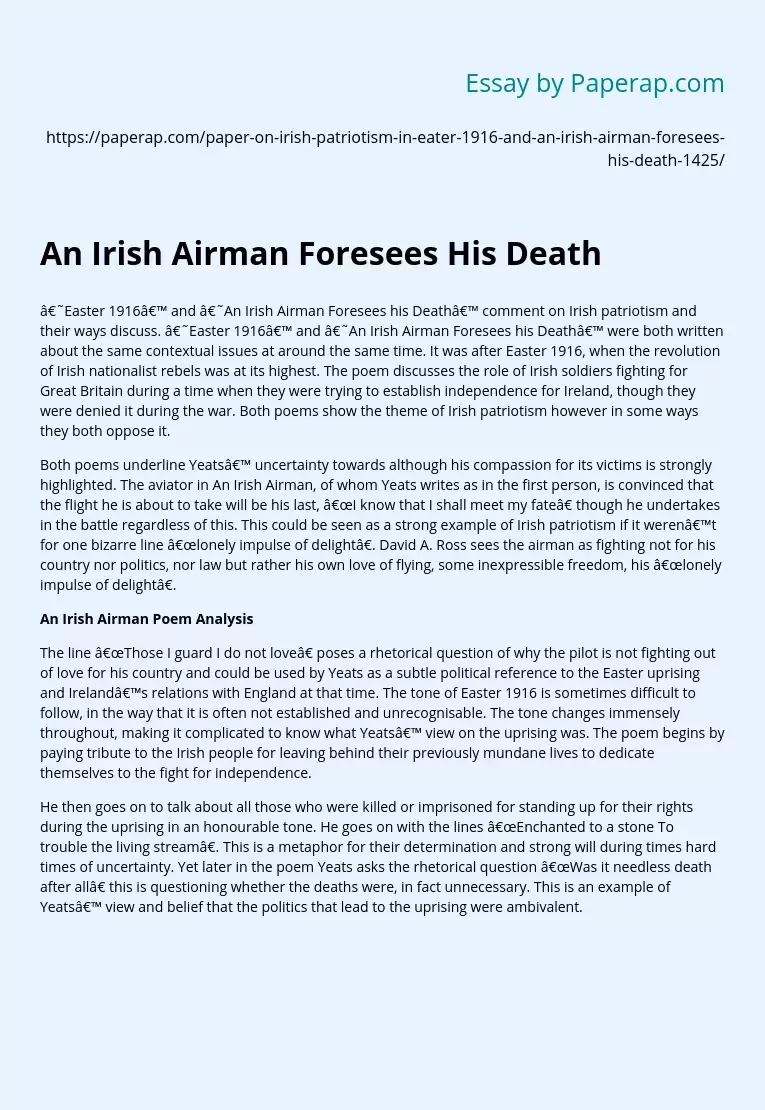An Irish Airman Foresees His Death
‘Easter 1916’ and ‘An Irish Airman Foresees his Death’ comment on Irish patriotism and their ways discuss. ‘Easter 1916’ and ‘An Irish Airman Foresees his Death’ were both written about the same contextual issues at around the same time. It was after Easter 1916, when the revolution of Irish nationalist rebels was at its highest. The poem discusses the role of Irish soldiers fighting for Great Britain during a time when they were trying to establish independence for Ireland, though they were denied it during the war.
Both poems show the theme of Irish patriotism however in some ways they both oppose it.
Both poems underline Yeats’ uncertainty towards although his compassion for its victims is strongly highlighted. The aviator in An Irish Airman, of whom Yeats writes as in the first person, is convinced that the flight he is about to take will be his last, “I know that I shall meet my fate” though he undertakes in the battle regardless of this.
This could be seen as a strong example of Irish patriotism if it weren’t for one bizarre line “lonely impulse of delight”. David A. Ross sees the airman as fighting not for his country nor politics, nor law but rather his own love of flying, some inexpressible freedom, his “lonely impulse of delight”.
An Irish Airman Poem Analysis
The line “Those I guard I do not love” poses a rhetorical question of why the pilot is not fighting out of love for his country and could be used by Yeats as a subtle political reference to the Easter uprising and Ireland’s relations with England at that time.
The tone of Easter 1916 is sometimes difficult to follow, in the way that it is often not established and unrecognisable. The tone changes immensely throughout, making it complicated to know what Yeats’ view on the uprising was. The poem begins by paying tribute to the Irish people for leaving behind their previously mundane lives to dedicate themselves to the fight for independence.
He then goes on to talk about all those who were killed or imprisoned for standing up for their rights during the uprising in an honourable tone. He goes on with the lines “Enchanted to a stone To trouble the living stream”. This is a metaphor for their determination and strong will during times hard times of uncertainty. Yet later in the poem Yeats asks the rhetorical question “Was it needless death after all” this is questioning whether the deaths were, in fact unnecessary. This is an example of Yeats’ view and belief that the politics that lead to the uprising were ambivalent.
An Irish Airman Foresees His Death. (2019, Dec 05). Retrieved from https://paperap.com/paper-on-irish-patriotism-in-eater-1916-and-an-irish-airman-foresees-his-death-1425/

